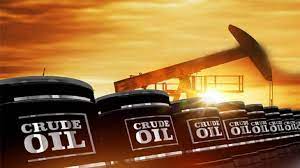
Oil prices soared on Monday as the United States and its allies placed further sanctions on Russia and barred several Russian banks from participating in a global payment system, potentially disrupting the country's oil supplies.
After hitting a high of $105.07 a barrel in early trade, Brent oil surged $4.82, or 4.9 per cent, to $102.75 by 1028 GMT.
On Monday, the Brent contract for April delivery ends. The most actively traded contract, for May delivery, was trading at $98.86, up $4.74.
After topping $99.10 in early trading, U.S. West Texas Intermediate (WTI) oil was up $4.62, or 5 per cent, at $96.21.
"Growing concerns about disruptions to Russian energy supplies are pushing oil and gas prices up sharply," said Commerzbank analyst Carsten Fritsch.
After Western nations placed harsh sanctions on Moscow and cut off some Russian banks from the SWIFT international payment system, Russia's exports of all commodities, from oil to grains, have been severely disrupted.
Physical markets slammed Russian crude oil grades, which represent for around 10% of world oil supplies.
Goldman Sachs increased its one-month Brent pricing projection from $95 to $115 a barrel.
"We expect the price of consumed commodities that Russia is a key producer of to rally from here - this includes oil," the bank said.
On Sunday, Russian President Vladimir Putin activated the country's nuclear deterrence. According to the Interfax news agency, Russian soldiers conquered two minor cities in southern Ukraine, but met fierce opposition elsewhere.
Ukraine and Russia have begun talks near the Belarusian border, according to a Ukrainian presidential adviser, with the goal of reaching an early ceasefire agreement.
"If there's any progress made in this meeting, we're going to see a sharp reversal in markets - we'll see stocks rise, the dollar rise and oil fall," said OANDA analyst Jeffrey Halley.
BP, the British oil company, has opted to sell its Russian oil and gas assets, launching a new front in the West's attempt to isolate Russia's economy. BP is the largest foreign investor in Russia.
"The sanctions and the exodus of Western oil companies are likely in the medium to long term to result in lower Russian oil and gas production," said Fritsch.
On March 2, the Organization of Petroleum Exporting Countries (OPEC) and allies led by Russia, known as OPEC+, are slated to hold a meeting.
The group is anticipated to maintain to its target of adding 400,000 barrels per day (bpd) of new supply in April.
OPEC+ cut down its prediction for the oil market surplus for 2022 by approximately 200,000 bpd to 1.1 million bpd ahead of the meeting, highlighting market pressure.
(Source:www.latestly.com)
After hitting a high of $105.07 a barrel in early trade, Brent oil surged $4.82, or 4.9 per cent, to $102.75 by 1028 GMT.
On Monday, the Brent contract for April delivery ends. The most actively traded contract, for May delivery, was trading at $98.86, up $4.74.
After topping $99.10 in early trading, U.S. West Texas Intermediate (WTI) oil was up $4.62, or 5 per cent, at $96.21.
"Growing concerns about disruptions to Russian energy supplies are pushing oil and gas prices up sharply," said Commerzbank analyst Carsten Fritsch.
After Western nations placed harsh sanctions on Moscow and cut off some Russian banks from the SWIFT international payment system, Russia's exports of all commodities, from oil to grains, have been severely disrupted.
Physical markets slammed Russian crude oil grades, which represent for around 10% of world oil supplies.
Goldman Sachs increased its one-month Brent pricing projection from $95 to $115 a barrel.
"We expect the price of consumed commodities that Russia is a key producer of to rally from here - this includes oil," the bank said.
On Sunday, Russian President Vladimir Putin activated the country's nuclear deterrence. According to the Interfax news agency, Russian soldiers conquered two minor cities in southern Ukraine, but met fierce opposition elsewhere.
Ukraine and Russia have begun talks near the Belarusian border, according to a Ukrainian presidential adviser, with the goal of reaching an early ceasefire agreement.
"If there's any progress made in this meeting, we're going to see a sharp reversal in markets - we'll see stocks rise, the dollar rise and oil fall," said OANDA analyst Jeffrey Halley.
BP, the British oil company, has opted to sell its Russian oil and gas assets, launching a new front in the West's attempt to isolate Russia's economy. BP is the largest foreign investor in Russia.
"The sanctions and the exodus of Western oil companies are likely in the medium to long term to result in lower Russian oil and gas production," said Fritsch.
On March 2, the Organization of Petroleum Exporting Countries (OPEC) and allies led by Russia, known as OPEC+, are slated to hold a meeting.
The group is anticipated to maintain to its target of adding 400,000 barrels per day (bpd) of new supply in April.
OPEC+ cut down its prediction for the oil market surplus for 2022 by approximately 200,000 bpd to 1.1 million bpd ahead of the meeting, highlighting market pressure.
(Source:www.latestly.com)





